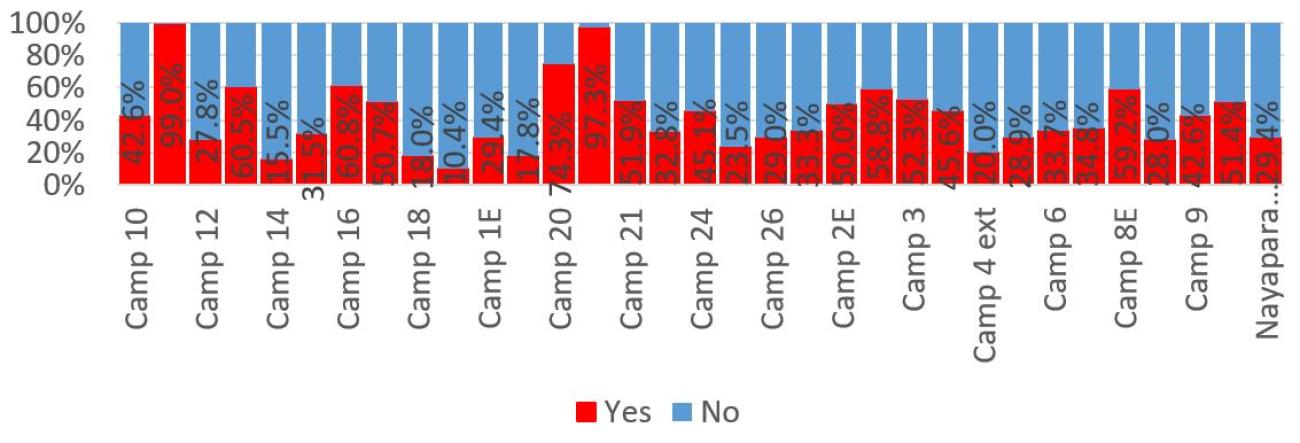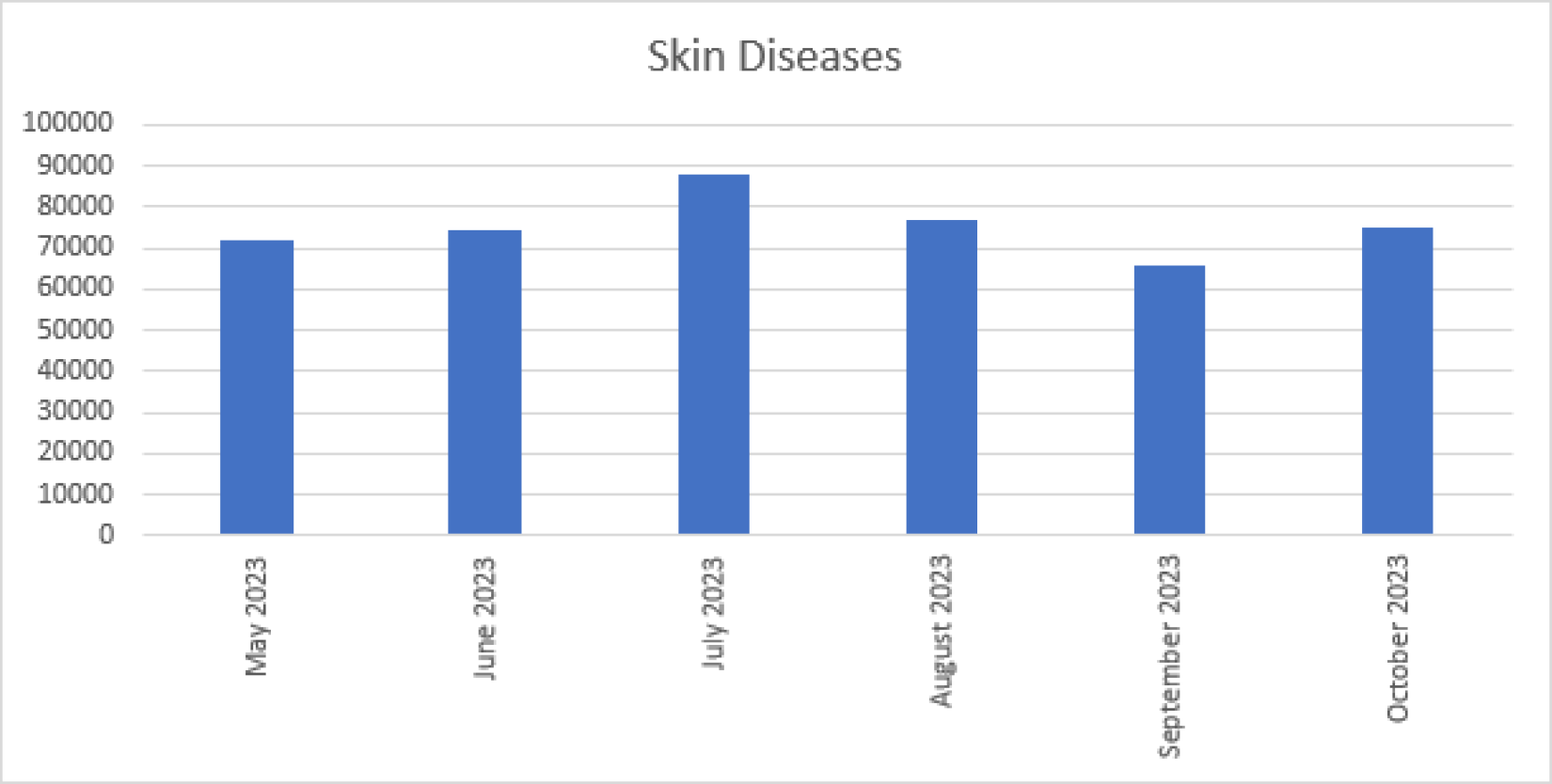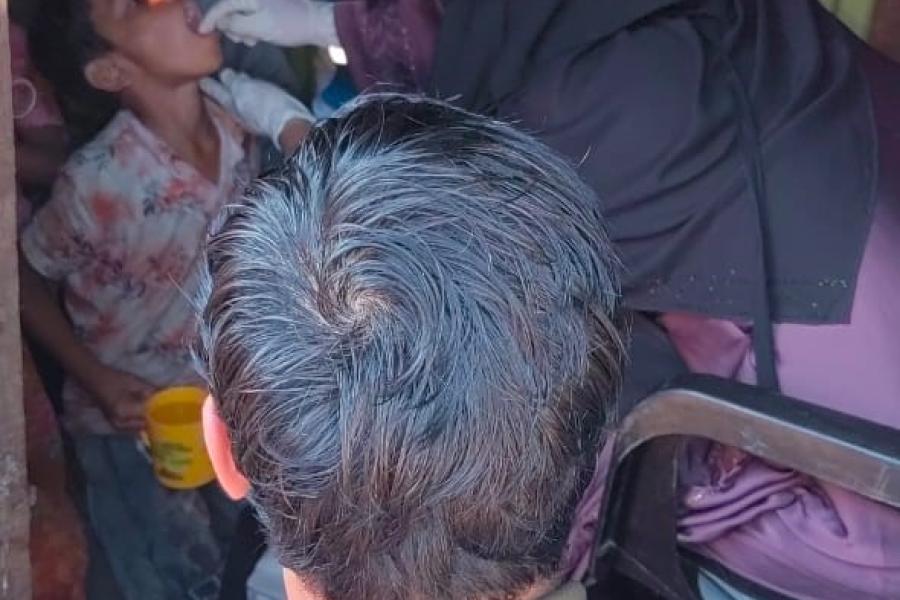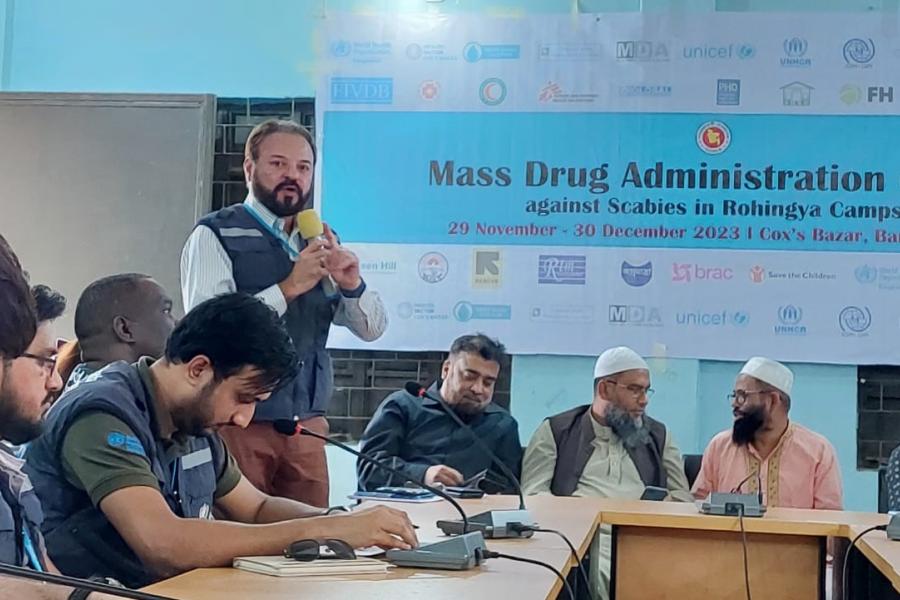WHO implements large-scale Ivermectin-based MDA for one million Rohingya refugees

29 January 2024
The World Health Organization (WHO) Bangladesh is carrying out a large-scale Mass Drug Administration (MDA) campaign in partnership with the Government of Bangladesh and Health Sector partners to break the transmission of persistent scabies upsurge among Rohingya refugees in Cox’s Bazar and Bhasan Char.
Running from November 29th, 2023, to February 01, 2024, this initiative strives to target nearly 1 million individuals residing in 33 camps in Cox’s Bazar and Bhasan Char Island, marking it as the world's most extensive MDA campaign for scabies treatment and prevention.
MDA is a crucial public health intervention where medicines are provided to large populations for disease prevention or control. The preferred treatment for scabies in MDA is the Ivermectin 3mg tablet and Permethrin 5% cream for contraindicated cases. The MDA treatment will be expanded to reach a broad population, addressing varying needs based on medical considerations.
The initiative was sparked by the heightened susceptibility of Rohingya refugees to scabies, as revealed by a WHO prevalence survey of May 2023. The survey indicated a prevalence rate of 39%, surpassing the crucial 10% WHO threshold necessitating MDA.
Facing initial funding gaps, WHO recommended the initiation of a cost-effective multi-sector response by the Health and WASH Sectors. While these efforts, including case identification and hygiene measures, partially reduced infestation in most camps, persistent transmission in some areas and increased health facility caseloads underscored the necessity for a sustained community-level strategy.

Source DHIS2 November 2023
Scaling up Ivermectin-based MDA
WHO aimed to provide therapeutics for over 992,500 Rohingya, including 5.2 million Ivermectin tablets and 185,000 tubes of Permethrin cream. MAP International made a significant donation of 3.2 million Ivermectin tablets in July 2023. WHO's global channels initiated the procurement of 2 million Ivermectin tablets and 138,726 Permethrin cream tubes to address potential shortages.
WHO conducted extensive training, preparing around 100 healthcare workers to oversee the MDA process. Additionally, 130 Community Health Worker Supervisors and over 1,600 Community UNHCR-led Health Workers were trained to administer the MDA treatment using the Directly Observed Treatment (DOT) strategy.
To enhance coordination, WHO formed the MDA Implementation Advisory Committee involving the Health and WASH Sectors to oversee implementation and finalise the micro-plan for MDA. Additionally, 68 storage sites, comprising 48 health facilities, were selected to securely manage, store, and distribute the drugs ahead of the campaign.
Roll out of MDA Campaign
The campaign was officially launched on November 29th, 2023, in Nayapara Camp. Dr David Otieno, leading the Epidemiology team at WHO, emphasised MDA as a proven strategy acknowledging scabies as endemic, and anticipating a significant reduction through post-MDA surveys. “WHO recommends MDA as a proven strategy to stop the spread of Preventive Chemotherapy for Neglected Tropical Diseases such as Onchocerciasis, Lymphatic Filariasis and scabies when it is implemented with the highest coverage targets,” says Dr David

Dr. Jorge Martinez, Head of the WHO Sub Office in Cox’s Bazar, acknowledged challenges, including financial constraints, expressing gratitude for donations, and urging careful execution.
“For over a year, we have been working hard on the process which faced many obstacles. One of the biggest challenges was the huge financial cost of delivering two doses for one cycle of MDA, which was almost USD 1 million.”
He expressed his gratitude to the WHO HQ for helping to find the pharmaceutical donation that supplied 3.2 million tablets and the Bureau of Population, Refugees, and Migration (BPRM) of the US Department of State for filling the financial gap that secured 2 million more tablets of ivermectin and 185,000 permethrin 5% cream.
Dr. Bardan Jung Rana, WHO’s Representative in Bangladesh, praised the accomplishment and reaffirmed the commitment to improving the health of Rohingya refugees. “This MDA is a significant accomplishment for WHO Bangladesh and its health sector partners, demonstrating our commitment to improving the health and well-being of Rohingya refugees and host communities in Cox’s Bazar,” Dr Rana said.
The MDA comprises two rounds of doses from November 29th, 2023, to February 01, 2024, covering all 33 camps in Teknaf, Ukhiya, and Bhasan Char Island

The campaign faced challenges, including funding shortages and financial constraints among health sector partners in Cox’s Bazar. Additionally, delays in drug procurement and logistics occurred due to limited global drug availability and complex procurement processes. Nevertheless, WHO and its partners remain dedicated to the success of the campaign and addressing the public health challenge posed by the scabies outbreak among Rohingya refugees.
The extensive MDA campaign is a major initiative undertaken by WHO and its partners to address the scabies outbreak among Rohingya refugees. While the challenges encountered underscore the complexities of dealing with public health emergencies, the commitment to enhance the health and well-being of the affected population remains steadfast.





